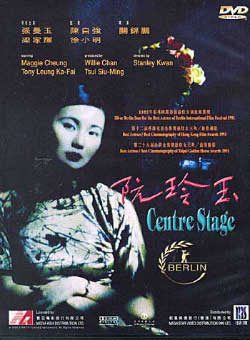

The delicate art film that came in at number 2
in the critics' poll found in Fredric Dannen and Barry Long's (1997) "Hong
Kong Babylon" is a Jackie Chan produced work helmed by the man who served
as assistant director on "Armour of God" (the movie best known as that which
has come closest to killing the action god). This glamorous bio-pic
of Ruan Lingyu (1910-1935) stars the woman who is probably still best known
to Western audiences for playing the girlfriend in five Jackie Chan vehicles
(including two, which came out in the same year as this 1992 Stanley Kwan
effort). For all of its links to Hong Kong cinema's most identifiable
face, the atmospheric period piece which made Maggie Cheung the first Hong
Kong actress to win a major international award (at the Berlin Film Festival)
would be my definite candidate for THE Jade Theatre offering which least
fits the popular image many people have of Hong Kong movies.






There are different versions out there - the 141 minute vs the 121 minute
version. If you have the 121 minute version here is what you missed:
Early in the film after Ruan's scene in the snow and then some movie clips of Ruan, there is a discussion between Maggie and Stanley in which Stanley talks about seeing Ruan's films as a child and thinking her sexy. He also imitates some of her gestures and expressions. Maggie chimes in "not superficially sexy, but sexy to the marrow."
After the Lilly Li interview (a tiny bit which is cut - and Maggie and Carina laughing together and Maggie says "I think that Lilly saw many things!"), Tony Leung discusses his character with Kwan.
The scene in which Carina begins singing a patriotic song and everyone joins in actually begins before this when the whole group is singing the song and the writer says "I don't know how to finish it"
After the interview with Mr. Shen - who discusses Ruan's relationship with Tang - there is a discussion between Kwan, Chin Han and Lawrence Ng about their characters and what happens to them after Ruan's death. Chin Han's character lost his fortune and went to Taiwan where he became a cigarette vendor, while Ng's character actually played himself in a film version of Ruan's life - but he was dead at 36.
One of the weakest parts of the DVD version is the portrayal of the relationship between Ruan and Tony's character. At one point she asks him to marry her - but there has been very little between them leading up to this. This is somewhat improved in the tape version. After Ng's character visits Maggie in her new home, there is a scene between Maggie and Tony in a restaurant in which they discuss the film New Woman and the mood of the scene is one of easy going friendship. This entire scene is edited out.
Later after the restaurant scene which is shown on the DVD in which Tony rejects her - there is a discussion with Tony and then Maggie about whether his character did in fact love Maggie. There is also a cut to Maggie singing "Blue Angel" (the Marlene Dietrich song) in front of a mirror for a few seconds. This was all edited out.
When Ruan is shown the newspaper story that begins her descent to suicide, there are no subs on the DVD. There are on the video - "Ching sues Ruan and Tang. Love and Cohabitation. Adultery and other counts"
A scene is edit out in which Kwan asks Maggie if she would react the same way as Ruan did. Considering that Maggie has in fact had her problems with the press it is interesting that she responds "I would try and play it cool".
Towards the end there are a number of changes. It feels like someone realized that they had a lot more to edit out and the film was getting near the end. As Maggie lays down her head on Chin Han and dies, the video breaks into the mournful ballad that the DVD ends with. During the funeral scene, there are numerous shots of between takes on the video - all excised from the DVD. It's amusing watching Maggie rise up and start laughing. On the video the film ends with Tony Leung sobbing violently - then a close up of a dead Ruan - a stunning shot - then Kwan yells out "Cut - ok" and Maggie draws a large breath. All edited out.
